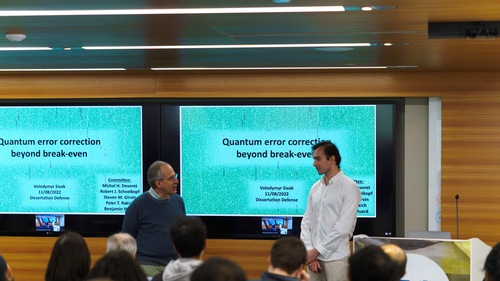
On November 8, 2022, Volodymyr Sivak successfully defended the thesis: “Quantum Error Correction Beyond Break-Even” (advisor: Michel Devoret).
Sivak explained, “Recently, there has been a lot of hype around quantum computing. Its practical utility hinges on the assumption that one day we will be able to create quantum bits of extremely high quality using quantum error correction. A lot of the efforts in academia and industry are devoted to making this process work, but so far this remained an elusive goal. This challenge hooked me during the grad school, and I decided to devote myself to solving it. In this experiment, we demonstrate for the first time that quantum error correction actually works, that it extends the quantum coherence of a system instead of reducing it. It validates the cornerstone assumption of quantum computing, and this makes me very excited about the future of this field.”
Sivak will be joining Google Quantum AI in Santa Barbara.
Thesis Abstract: Although quantum at its fundamental level, nature appears classical on a macroscopic scale. Since the collective degrees of freedom of large objects have multiple pathways for the spread of entanglement with the surrounding environment, they rapidly decohere. The ambition of harnessing nature’s ultimate computing power is at odds with this fundamental phenomenon. Therefore, quantum error correction (QEC) will be indispensable for achieving such a goal. This cooperative phenomenon, which requires participation of multiple quantum and classical components, creates a special type of dissipation that removes entropy brought into the system by the errors, thereby protecting the stored quantum information against naturally occurring decoherence. In the previous attempts to engineer such a process, the control overhead induced a surplus of errors that overwhelmed the error-correcting ability of the process itself. The purpose of this thesis work is to overcome such challenges. Our main result is the first demonstration of a fully stabilized and error-corrected logical qubit whose quantum coherence is significantly longer than that of all the imperfect quantum components involved in the QEC process, beating the best of them with a coherence gain of $G=2.27\pm0.07$. This was achieved through a combination of innovations ranging from a novel technique of fabrication superconducting quantum circuits to reinforcement learning methods for model-free optimization of the QEC protocol. The experiment reported in this thesis uplifts quantum error correction from proof-of-principle studies to a practical tool for extending quantum coherence.